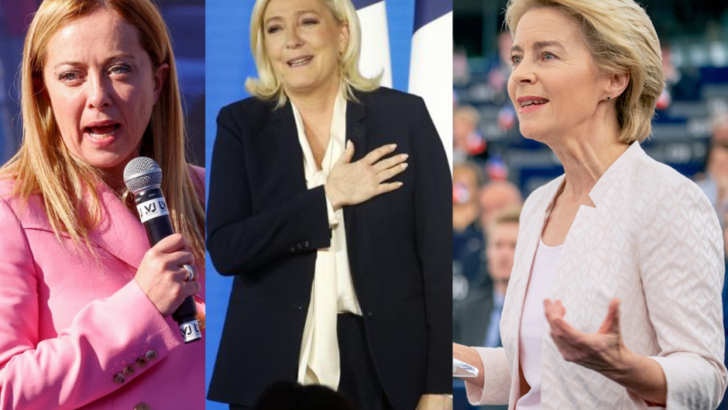We often hear rallying calls to get more women into politics – and I’m all for supporting such encouragement. Indeed, plenty of impressive women emerged in last week’s local elections.
In the context of the EU, it’s now predicted that three women are seen as the ‘queens of Europe’ – and likely to dominate the agenda of European politics in the coming times.
This trio comprises Ursula von der Leyen, in Brussels, Giorgia Meloni in Rome and, quite possibly, Marine le Pen in Paris – her right-wing National Rally party may well take control after the French general election on June 30 and July 7.
Mussolini
Ms Meloni, as Prime Minister of Italy, was feared as an heir to Mussolini when she first appeared on the political stage leading the populist, right-wing “Brothers of Italy”. But The Times of London now reports that she has “proved adept at making friends among mainstream conservatives”, and her new best friend is Ursula von der Leyen, EU leader.
It’s often been supposed that women in politics are expected to be more caring, more compassionate – and more left-wing”
The two women are on sisterly terms, although Giorgia comes from a working-class background, and speaks the Roman argot of the poorer quarters, while Ursula is the Euro aristocrat – highly educated, tri-lingual, attached to her horses (and a mother of seven).
The duo seem to have had a reciprocal impact on one another, politically: Ms Meloni has become less hostile to the EU, and has moved to support Ukraine, in line with EU policy. While Madame von der Leyen has shifted to the right on issues like controlling EU immigration, reflecting current Continental European trends.
It’s often been supposed that women in politics are expected to be more caring, more compassionate – and more left-wing. The women who have come to the fore as Irish political leaders have tended to be from the left, if we think of Mary Lou McDonald, Ivana Bacik and Holly Cairns.
Queens
But in the broader picture, the EU ‘queens’ are placed on the right of the political spectrum.
That’s democracy. It reflects the aspirations of the voters.
All three women adhere to a religious identity: Von der Leyen is a Lutheran, while Meloni describes herself as a “Christian”, and upholds many traditional Catholic values, including pro-natalism and opposition to assisted dying. Marine Le Pen was raised a Catholic, but is liberal on issues like abortion, and affirms France’s secularism: yet she says she has a religious faith, honours St Joan of Arc and sees France’s history as inextricably connected with Catholicism.
What was once disparagingly described as “petticoat rule” may surprise us.
Power of the Muslim vote…
Fashionistas have observed that Angela Rayner – likely to be Deputy Prime Minister of the United Kingdom after July 4 – has been dressing in a noticeably demure style. Her frocks have been buttoned up to her neck and some down to her ankles.
But this is about politics, not fashion. Ms Rayner’s Manchester constituency of Ashton-under-Lyne has a marked quotient of Muslim voters. There are eight mosques in this suburb of 48,600 people, which has double the UK national percentage of Muslims.
And Muslim voters like to see their female MPs dress modestly.
Fair play to Angela in responding to the sensitivities of her electorate. The Labour Party is aware of the power of the Muslim vote (and hence the sensibilities around Gaza and Palestine).
Once they would have been aware of the Catholic vote – the Labour Prime Minister Harold Wilson was attuned to his Catholic electorate in Huyton, in Greater Liverpool – but today that would no longer be a factor in voting.
Angela Rayner identifies as a socialist, and seems a spirited lass. She was a single mother at 17, and a grandmother at 37. She has three sons, one of whom was born at 23 weeks pregnancy.
***
Irish boarding schools may soon experience an inflow of British school pupils – a Labour government has pledged to slap VAT on private education, causing financial panic among parents who chose independent schools for their sprogs. (In Britain, you wouldn’t get much change from £50,000 – €59,000 – this being the annual fee at many an élite British boarding school.)
A private education in the Republic of Ireland costs somewhat less – Blackrock College, which heads the list of best Irish boarding schools, is a mere €19,700 annually. Nord Anglia’s Dublin International School – very posh – charges €24,000.
The leading Irish schools recommended by the British education consultancy Smapse Education surprised me – some I hadn’t heard of previously. Blackrock is the only Catholic school listed in the top five (these being: Blackrock, Midleton College, Cork, Villiers School in Limerick, Monaghan Collegiate School and Royal Cavan School.)
Although boarding schools are broadly in decline (and often criticised, especially by kids who have attended one) there is so much globalism today, with parents working and living overseas, that there will always be some call for these educational institutions. At a cost.


 Mary Kenny
Mary Kenny (L-R) Giorgia Meloni, Marine le Pen and Ursula von der Leyen
(L-R) Giorgia Meloni, Marine le Pen and Ursula von der Leyen